MARAWI CITY (MindaNews / 22 February) — Leaders of Bangsamoro civil society organizations in Mindanao called on Congress to pass the Bangsamoro Basic Law (BBL) drafted by the Bangsamoro Transition Commission (BTC), and urged the national government to ensure Meranaws are consulted in planning the rehabilitation of Marawi, as failure of either will push more people into violent extremism.
“The failure of BBL or the failure of rehabilitation of Marawi will lead to more frustration and will be a lethal blow to peace,” Guiamel Alim, chair of the Consortium of Bangsamoro Civil Society (CBCS), lead organizer of the Bangsamoro CSO Leaders’ Peace Summit, told MindaNews on Tuesday.
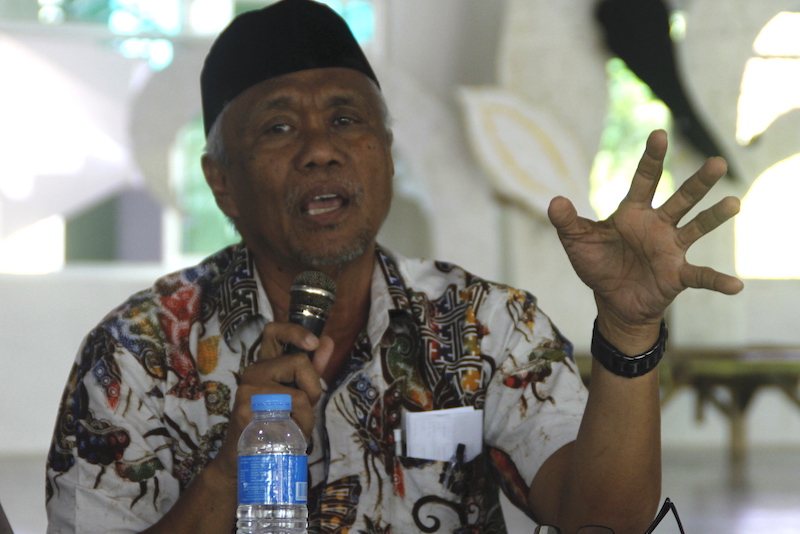 Guiamel Alim, chair of the Consortium of Bangsamoro Civil Society (CBCS) says the failure of BBL or the “failure of rehabilitation of Marawi will lead to more frustration and will be a lethal blow to peace.” MIndaNews photo by H. MARCOS C. MORDENO
Guiamel Alim, chair of the Consortium of Bangsamoro Civil Society (CBCS) says the failure of BBL or the “failure of rehabilitation of Marawi will lead to more frustration and will be a lethal blow to peace.” MIndaNews photo by H. MARCOS C. MORDENO
“Both are deadly cocktail of powderkeg waiting to explode if not handled properly,” Dr. Acram Latiph, Executive Director of the Mindanao State University’s Institute of Peace and Development in Mindanao (IPDM), a co-organizer of the Summit, told MindaNews.
At the closing rites held at the IPDM Tuesday noon, Latiph said that if the BBL had been passed under the Aquino administration, “baka walang Marawi Siege, walang ISIS(-inspired groups) [there may have been no Marawi Siege, no ISIS-inspired groups], noting what Omar Maute said of the sentiment of dissatisfaction and feeling that “niloloko tayo, pinapaasa (we are being fooled and being made to expect) and this actually convinced a lot of our radicals to join the ISIS.”
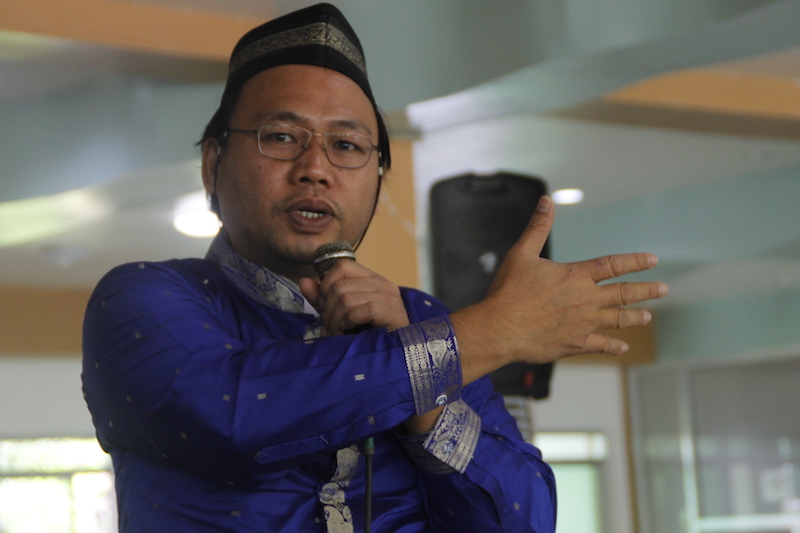 If the Bangsamoro Basic Law had been passed under the Aquino administration, the Marawi Siege may not have happened, says Dr. Acram Latiph, Executive Director of the Mindanao State University’s Institute of Peace and Development in Mindanao. MindaNews photo by H. MARCOS C. MORDENO
If the Bangsamoro Basic Law had been passed under the Aquino administration, the Marawi Siege may not have happened, says Dr. Acram Latiph, Executive Director of the Mindanao State University’s Institute of Peace and Development in Mindanao. MindaNews photo by H. MARCOS C. MORDENO
The Summit that started Sunday was followed by a Solidarity Peace Walk for Marawi inside the MSU campus on Monday with at least a hundred CSO leaders and thousands of students and professors led by MSU President Habib Macaayong, and representatives from the security sector.
The Summit was capped by a visit to ‘Ground Zero’ on Tuesday morning although three busloads of participants were allowed only to drive through a portion of what was the main battle areas during the May to October 2017 siege.
In their “Declaration of Support for the urgent passage of the BTC-drafted BBL and for the participatory and responsive rehabilitation of Marawi City,” the Moro CSO Leaders said they are “alarmed by current developments in our homeland, especially on the threat of extremist violence in our midst” and that they are “apprehensive on the uncertainty of the fate of the BTC-drafted BBL” and on the “growing restiveness and polarization of the people, including the Bangsamoro on the issue of charter change.”
“Kasama ba kami sa pagplano?”
The leaders said “Meranaw voices must not be ignored in the rebuilding of Marawi City” because Marawi “is their homeland, and therefore, it is but appropriate that current government officials at local and national levels will engage ordinary Meranaw constituents in crafting the kind of development they want for their beloved city.”
They added that the rehabilitation of Marawi should be “culturally sensitive, appropriate, holistic, and responsive. But most of all, it should be based on maximum people participation.”
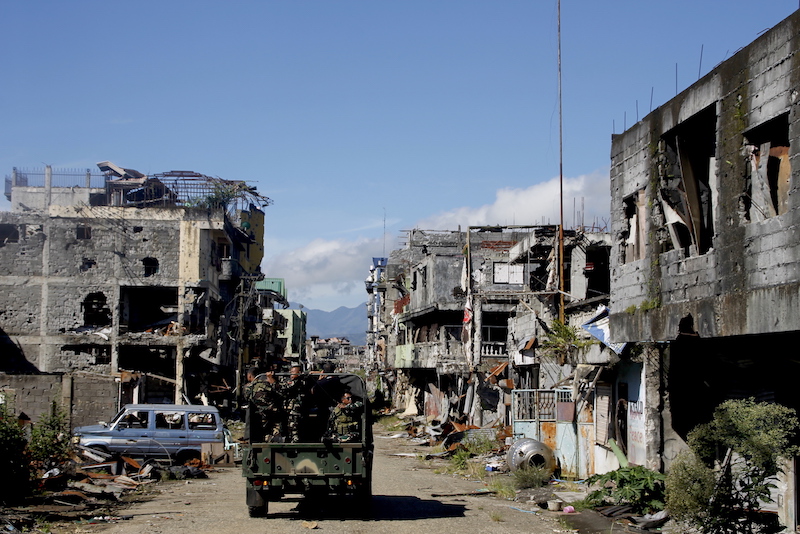 GHOST TOWN. Soldiers survey the ruins in what used to be the commercial district of Marawi City on Tuesday, 20 February 2018. Moro civil society leaders who concluded their Peace Summit in Mindanao State University on Tuesday described the amount of force used against the Islamic State-inspired militants who attacked the city last year as an overkill. MindaNews photo by H. MARCOS C. MORDENO
GHOST TOWN. Soldiers survey the ruins in what used to be the commercial district of Marawi City on Tuesday, 20 February 2018. Moro civil society leaders who concluded their Peace Summit in Mindanao State University on Tuesday described the amount of force used against the Islamic State-inspired militants who attacked the city last year as an overkill. MindaNews photo by H. MARCOS C. MORDENO
Retired MSU Professor Dalomabi Lao Bula, who spoke on behalf of the internally displaced persons (IDPs) at the program after the peace walk, said “Tayo po ay nagtipon -tipon ngayon dahil sa kapayapaan at dahil dito (We are gathered here for peace and for this), we are asking the powers that be, to give us IDPs peace of mind by giving us concrete, acceptable, culture-sensitive and immediate solutions to our lamentations.”
Bula said the National Economic and Development Authority’s comprehensive plan for the rehabilitation and reconstruction of Marawi will reportedly be presented for consultation but when it was made, “kasama ba kami sa pagplano..? Makakapagsalita ba at pakikinggan kaming IDPs sa consultation? Makakapasok ba kami sa consultation? Magkano kaya kung mayron man, ang assistance para sa winasak na mga kabahayan namin, na kasamang gumuho ang aming mga pangarap para sa kinabukasan ng aming mga anak?” (where we part of the planning? Can we speak and will they listen to the IDPs during the consultation? Can we enter the venue of the consultation? How much, if at all there is, will the assistance be for those whose houses).
‘Martial Law is not for the Bangsamoro’
Bula also said the 400-M peso budget for the military camp at the old City Hall site in Barangay Kapantaran whose groundbreaking on January 30 President Rodrigo Duterte attended, “is not at all a solution to violent extremism.”
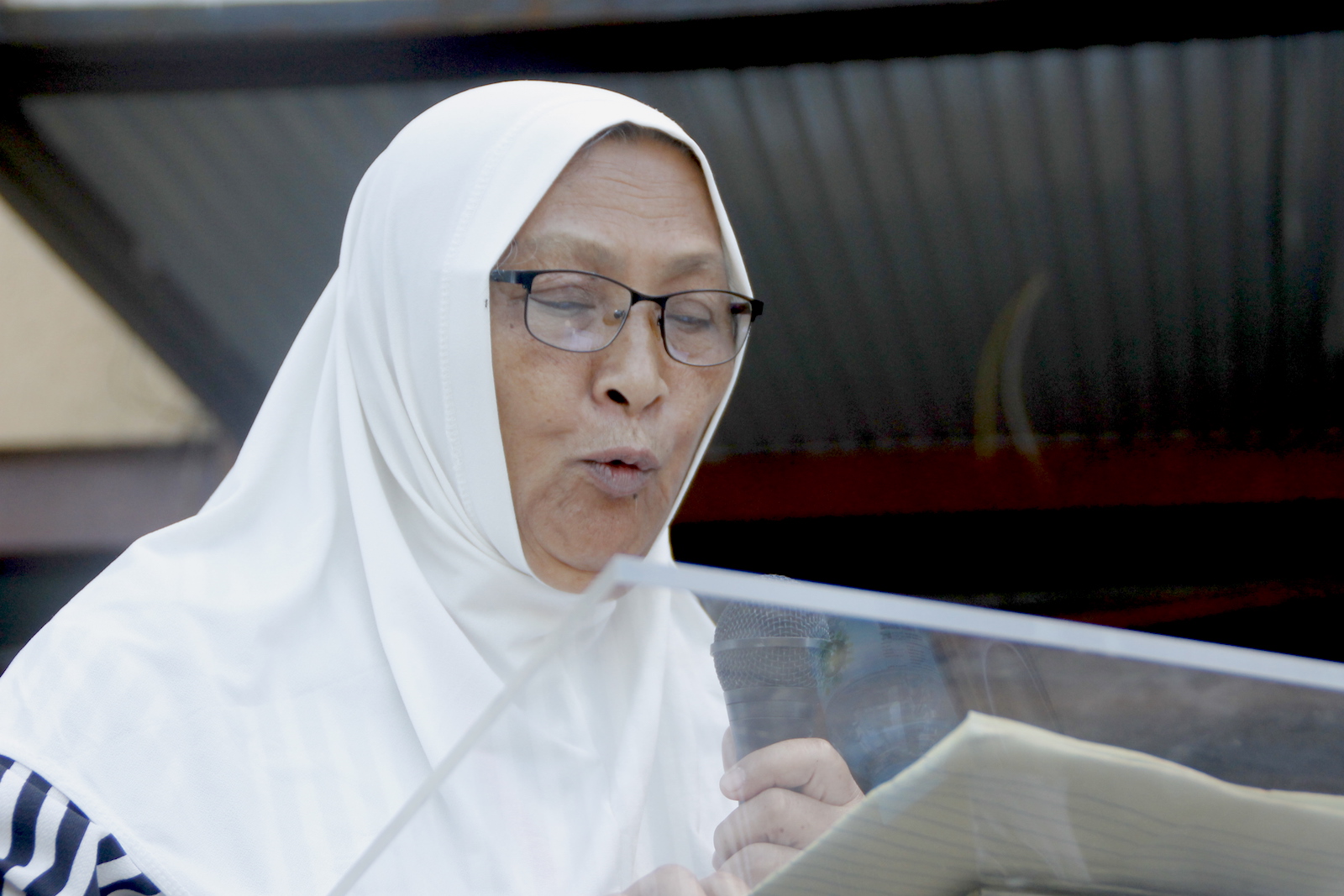 Retired MSU professor Dalomabi Lao Bula speaks on behalf of the internally displaced persons (IDPs) during the program after the Solidarity Peace Walk for Marawi on 19 February 2018 at the Mindanao State University in Marawi City. MindaNews photo by H. MARCOS C. MORDENO
Retired MSU professor Dalomabi Lao Bula speaks on behalf of the internally displaced persons (IDPs) during the program after the Solidarity Peace Walk for Marawi on 19 February 2018 at the Mindanao State University in Marawi City. MindaNews photo by H. MARCOS C. MORDENO
“The call of the hour now is for us, the IDPs or Bakwit, to be returned to our homes. Why not allocate those millions to our devastated dwellings, give us, and not loan, livelihood assistance and we will do the rest for our pagbangon, with the guidance of Allah?” Bula said.
Mochtar Matuan, former IPDM Director, said non-Meranaw planners should understand how Meranaws are tied to their land, mosque and leader. “I cannot claim to be a Meranao if I cannot identify a piece of land na pag-aari ng aking mga ninuno (owned by my ancestors).
He said Meranaws who were born or reside outside Marawi know their roots in Marawi. “The concept sa Meranaw is isa ka datu, isa ka masji, isa ka agama – one leader, one mosque, one community” and if the planners develop Marawi by displacing people from their communities, this will disrupt their way of life. Where will the Sultan be if there is no land and no people? “If you alter that, para bang pinapa-suicide ang mga Meranaw maging extremist na sila, wala na sila. They are nothing,” he said.
The CSO Leaders in their declaration said they “wonder about the logic of expanding military sites and materiel, as the military strategy has been highly arbitrary and forceful, making ordinary people fear for their lives.”
At the cultural presentation Monday afternoon, Fatima Pir Allian, program manager of the Nisa Ul Haqq Fi Bangsamoro (Women for Truth and Justice in the Bangsamoro), said “Magkaisa tayo sa pagbangon ng Marawi. Magkaisa tayo para sa pag-unlad ng Bangsamoro! Ang Marawi ay tayo! Tayo ang Marawi! Ang BTC-BBL ay tayo! Tayo ang BTC-BBL. Pero ang Martial Law ay hindi para sa Bangsamoro. Kapayapaan! Katarungan para sa Bangsamoro, In Sha Allah” (Let us unite. (Let us unite for the recovery of Marawi. Unite for the progress of the Bangsamoro. Marawi is us. We are Marawi. The BTC-BBL is us. We are the BTC-BBL. But Martial Law is not for the Bangsamoro. Peace. Justice for the Bangsamoro).
Self-determination
The leaders said the BTC-drafted BBL “embodies the concrete expression of self-determination of the Bangsamoro,” a right acknowledged by international conventions and guaranteed by the Constitution but “unfortunately, the Bangsamoro has been deprived of this right for centuries.”
The BBL is the legal expression of the political agreement — Comprehensive Agreement on the Bangsamoro — signed by government and the Moro Islamic Liberation Front (MILF) on March 27, 2014, and which Congress must pass
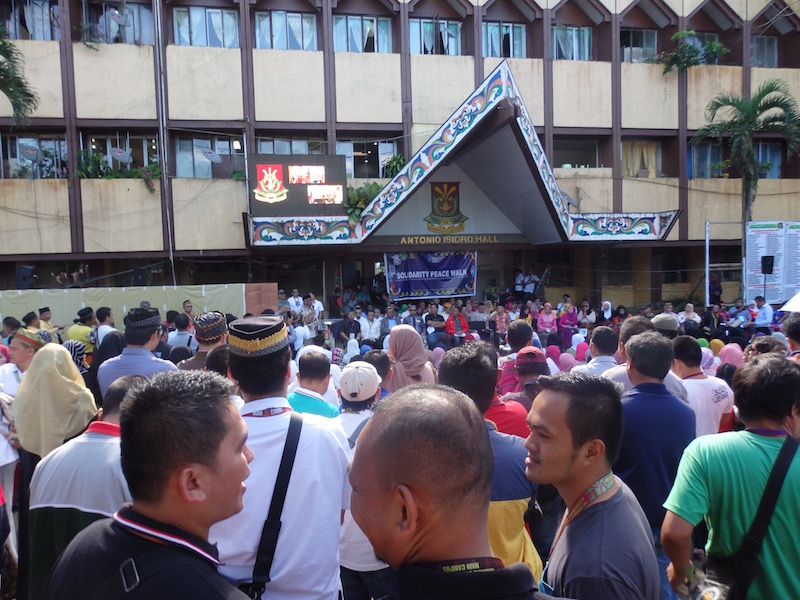 Program at the entrance of the Administration Building at the Mindanao State University main campus in Marawi City after the Solidarity Peace Walk for Marawi on 19 February 2018. The peace walk was part of the activities of the Bangsamoro CSO Leaders’ Summit that started February 18 and ended on February 20. MindaNews photo by CAROLYN O. ARGUILLAS
Program at the entrance of the Administration Building at the Mindanao State University main campus in Marawi City after the Solidarity Peace Walk for Marawi on 19 February 2018. The peace walk was part of the activities of the Bangsamoro CSO Leaders’ Summit that started February 18 and ended on February 20. MindaNews photo by CAROLYN O. ARGUILLAS
“It presents an opportunity to build needed social structures to promote lasting peace and unity, healing and reconciliation, and eventually conflict transformation; thereby catalyzing development in the Bangsamoro homeland,” the CSO leaders said.
“Most importantly,” the leaders said, the BTC-drafted BBL “addresses legitimate grievances of the Bangsamoro and historical injustices committed against them by both colonial and past Philippine government administrations.”
Addressing historical injustices
President Rodrigo Duterte, the 16th President of the Philippines and the first Mindanawon to lead the nation, inherited four peace agreements from six administrations — Marcos, Aquino the mother, Ramos, Estrada, Arroyo, Aquino the son — the 1976 Tripoli Agreement and 1996 Final Peace Agreement with the Moro National Liberation Front and the 2012 Framework Agreement on the Bangsamoro and the 2014 Comprehensive Agreement on the Bangsamoro with the MILF.
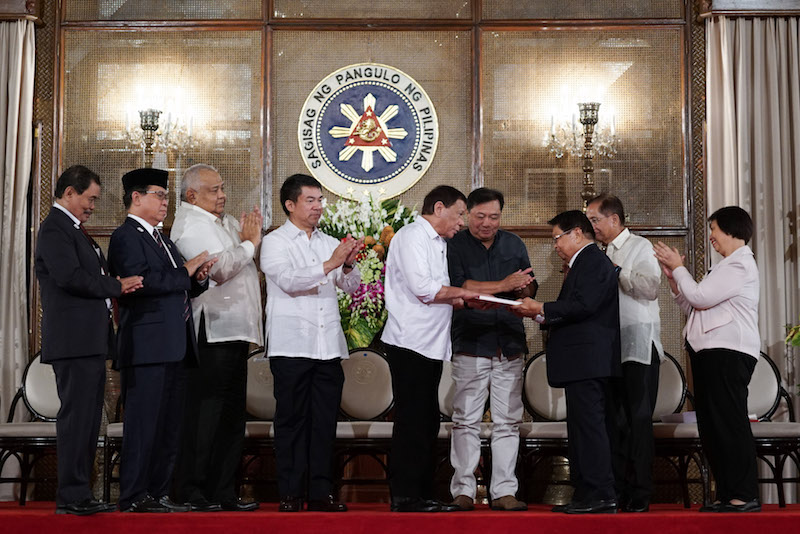 President Rodrigo Roa Duterte receives a copy of the proposed Bangsamoro Basic Law (BBL) from Bangsamoro Transition Commission (BTC) chair Ghazali Jaafar in a turnover ceremony at the Rizal Hall in Malacañan Palace on July 17, 2017. Also in the photo are (from left) Moro Islamic Liberation Front (MILF) Peace Implementing Panel chair Mohagher Iqbal, MILF Chairman Murad Ebrahim, Executive Secretary Salvador Medialdea, Senate President Aquilino Pimentel III, House Speaker Pantaleon Alvarez, Presidential Adviser on the Peace Process Jesus Dureza and Government of the Philippines Implementing Peace Panel Chair Irene Santiago. King Rodriguez/PRESIDENTIAL PHOTO
President Rodrigo Roa Duterte receives a copy of the proposed Bangsamoro Basic Law (BBL) from Bangsamoro Transition Commission (BTC) chair Ghazali Jaafar in a turnover ceremony at the Rizal Hall in Malacañan Palace on July 17, 2017. Also in the photo are (from left) Moro Islamic Liberation Front (MILF) Peace Implementing Panel chair Mohagher Iqbal, MILF Chairman Murad Ebrahim, Executive Secretary Salvador Medialdea, Senate President Aquilino Pimentel III, House Speaker Pantaleon Alvarez, Presidential Adviser on the Peace Process Jesus Dureza and Government of the Philippines Implementing Peace Panel Chair Irene Santiago. King Rodriguez/PRESIDENTIAL PHOTO
The BBL will pave the way for the creation of the Bangsamoro, a new autonomous political entity that would replace the Autonomous Region in Muslim Mindanao. Delay in the passage of the Bangsamoro law affects not only the timetable for the creation of the Bangsamoro but also the decommissioning of MILF combatants and weapons.
Under the Bangsamoro Peace and Development Roadmap that he approved in July 2016, target date for the passage of the BBL was yearend 2017.
It took Duterte four months after approving the roadmap, to sign an Executive Order on November 7, 2016 creating the expanded, 21-member BTC (15 under the Aquino administration) but it took him over three months to name its members.
The BTC submitted the draft BBL to the President on July 17, 2017 in Malacanang, in the presence of Senate President Aquilino Pimentel III and House Speaker Pantaleon Alvarez, Jr. But it took Malacanang a month before it transmitted the draft to the two houses of Congress where its filing took yet another month in the House and in the Senate, the BTC draft was filed only in mid-January.
At present, there are four versions of the proposed Bangsamoro law in the House, including the BTC draft, and four versions in the Senate, including the BTC draft.
The two houses assured they would pass the law before March 23. Congress takes a break March 24 to May 13. (Carolyn O. Arguillas / MindaNews)
